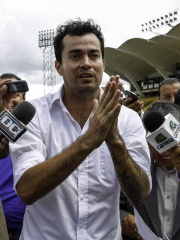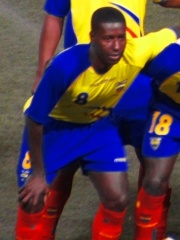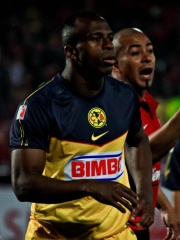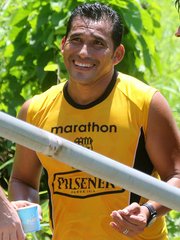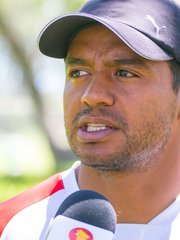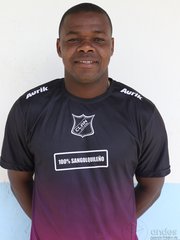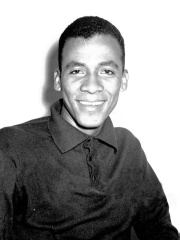
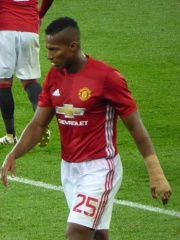
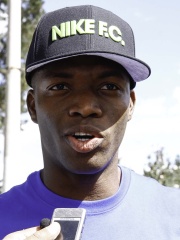
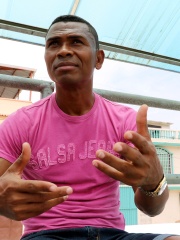
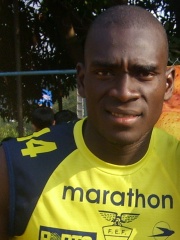
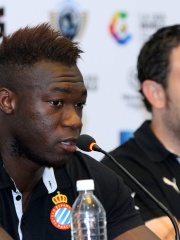
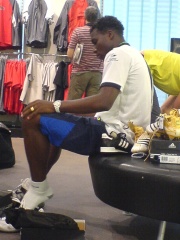
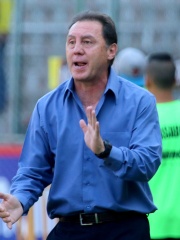
The Most Famous
SOCCER PLAYERS from Ecuador
This page contains a list of the greatest Ecuadorean Soccer Players. The pantheon dataset contains 21,273 Soccer Players, 84 of which were born in Ecuador. This makes Ecuador the birth place of the 54th most number of Soccer Players behind Egypt, and Georgia.
Top 10
The following people are considered by Pantheon to be the top 10 most legendary Ecuadorean Soccer Players of all time. This list of famous Ecuadorean Soccer Players is sorted by HPI (Historical Popularity Index), a metric that aggregates information on a biography's online popularity. Visit the rankings page to view the entire list of Ecuadorean Soccer Players.

1. Alberto Spencer (1937 - 2006)
With an HPI of 62.16, Alberto Spencer is the most famous Ecuadorean Soccer Player. His biography has been translated into 28 different languages on wikipedia.
Alberto Pedro Spencer Herrera (6 December 1937 – 3 November 2006) was an Ecuadorian footballer who played as a forward, and is widely regarded as one of the best Ecuadorian men's footballers of all time. He is probably best known for his still-standing record for scoring the most goals in the Copa Libertadores, the premier club tournament in South America. He was elected the 20th best South American footballer of the 20th century in a poll by the IFFHS in 2004. He was known as "Cabeza Mágica" (Spanish for magic head).

2. Antonio Valencia (b. 1985)
With an HPI of 56.29, Antonio Valencia is the 2nd most famous Ecuadorean Soccer Player. His biography has been translated into 64 different languages.
Luis Antonio Valencia Mosquera, known as Antonio Valencia (Spanish pronunciation: [anˈtonjo βaˈlensja]; born 4 August 1985), is an Ecuadorian former professional footballer who played primarily as a right-sided player throughout his career, initially as a right winger, before developing into a right-back. He is regarded as one of the best Ecuadorian footballers of all time. After progressing through the youth system at El Nacional, Valencia became a first team regular and made over 80 appearances for the club. He won the Ecuadorian Serie A with them before signing for La Liga side Villarreal in 2005. He only made two league appearances for the Spanish side in between loan spells at Recreativo for the 2005–06 season and later English Premier League club Wigan Athletic from 2006 to 2008. Wigan Athletic later signed Valencia on a three-year deal for an undisclosed fee in January 2008. His performances for Wigan Athletic soon attracted attention from several high-profile clubs, and he signed for Manchester United in June 2009. His time there established him as one of the greatest Ecuadorian players of all time, as Valencia was voted into the PFA Team of the Year in his debut season, and went on to win two Premier League titles, an FA Cup, two League Cups, three FA Community Shields and the UEFA Europa League, captaining the club in his final season. After ten years with United, Valencia returned to Ecuador in July 2019, signing with LDU Quito, with whom he won the inaugural Copa Ecuador in his first season. He announced his retirement in May 2021. Valencia made his Ecuador debut in 2004 and has represented his country at the 2006 FIFA World Cup, the 2007 Copa América, the 2011 Copa América, the 2014 FIFA World Cup, the Copa América Centenario and the 2019 Copa América. Valencia won 99 caps and scored 11 goals for his country.

3. Enner Valencia (b. 1989)
With an HPI of 55.54, Enner Valencia is the 3rd most famous Ecuadorean Soccer Player. His biography has been translated into 55 different languages.
Enner Remberto Valencia Lastra (born 4 November 1989) is an Ecuadorian professional footballer who plays as a striker for Liga MX club Pachuca and captains the Ecuador national team. Valencia previously played for Emelec in Ecuador, where he won the 2013 Ecuadorian Serie A and was awarded the Copa Sudamericana Golden Boot in 2013. He also played for Pachuca in Mexico, being awarded the Liga MX Golden Boot in the 2014 Clausura tournament. He joined English club West Ham United for an estimated £12 million in July 2014, almost breaking the club's signing record. In August 2016, Valencia went out on loan to Everton for the season, before being sold to Mexican club Tigres UANL in July 2017. At Tigres, he won Liga MX's 2017 Apertura and 2019 Clausura tournaments, and finished runner-up in the 2019 CONCACAF Champions League, winning the latter competition's Golden Boot. In August 2020, Valencia signed for Fenerbahçe in Turkey and won the Turkish Cup in his final season, before joining Brazilian club Internacional in mid-2023. At the international level, Valencia has earned over 100 caps for Ecuador since his debut in 2012. He represented the nation at the FIFA World Cup in 2014 and 2022, and the Copa América in 2015, 2016, 2019, 2021 and 2024. Widely regarded as one of the best Ecuadorian players of all time, Valencia is Ecuador's all-time top scorer with 48 goals, and has also scored a record six World Cup goals for his national team.

4. Iván Hurtado (b. 1974)
With an HPI of 52.20, Iván Hurtado is the 4th most famous Ecuadorean Soccer Player. His biography has been translated into 33 different languages.
Iván Jacinto Hurtado Angulo (born 16 August 1974) is an Ecuadorian politician and former professional footballer who played as a centre back. Hurtado participated at six Copa Américas and two FIFA World Cups. With 168 international appearances for Ecuador between 1992 and 2014, he is considered one of the best Ecuadorian players of all time and was the most capped South American male footballer until Lionel Messi overtook him during the 2022 FIFA World Cup. He is also the 17th-most-capped male international footballer. In 2013, Hurtado entered politics and was elected to the National Assembly for the PAIS Alliance.
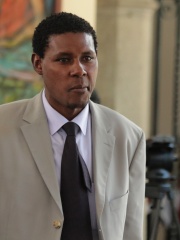
5. Agustín Delgado (b. 1974)
With an HPI of 51.97, Agustín Delgado is the 5th most famous Ecuadorean Soccer Player. His biography has been translated into 31 different languages.
Agustín Javier Delgado Chalá (born 23 December 1974) is an Ecuadorian politician and former professional footballer who played as a forward. Nicknamed El Tín, he was the all-time top scorer for the Ecuador national team with 31 goals in 71 games before being overtaken by Enner Valencia. Delgado played professional club football in Ecuador, Mexico and England. Delgado made his debut for the Ecuador national team against Peru in 1994. He has earned 71 caps, scoring 31 goals. He was part of their squad at the 2002 FIFA World Cup & 2006 FIFA World Cup, where he became the first Ecuadorian to score a goal in the FIFA World Cup.

6. Segundo Castillo (b. 1982)
With an HPI of 51.11, Segundo Castillo is the 6th most famous Ecuadorean Soccer Player. His biography has been translated into 30 different languages.
Segundo Alejandro Castillo Nazareno (born 15 May 1982) is an Ecuadorian football coach and former player who played as a midfielder. He was recently the manager of Barcelona SC. Between 2003 and 2016, Castillo made 87 appearances for the Ecuador national team scoring 9 goals. Castillo has also played abroad for football clubs in Serbia, England, Mexico and Saudi Arabia.

7. Felipe Caicedo (b. 1988)
With an HPI of 51.11, Felipe Caicedo is the 7th most famous Ecuadorean Soccer Player. His biography has been translated into 35 different languages.
Felipe Salvador Caicedo Corozo (born 5 September 1988) is an Ecuadorian professional footballer who plays as a striker for Barcelona S.C. A full international from 2005 to 2017, Caicedo represented Ecuador at the Copa América in 2007 and 2011, as well as at the 2014 World Cup. Caicedo is also Ecuador's sixth highest goalscorer of all-time with 22 goals to his name.

8. Carlos Tenorio (b. 1979)
With an HPI of 50.27, Carlos Tenorio is the 8th most famous Ecuadorean Soccer Player. His biography has been translated into 29 different languages.
Carlos Vicente Tenorio Medina (born 14 May 1979) is an Ecuadorian former footballer who last played for Ecuadorian club Atlético Saquisilí. From 2001 to 2009, he played for the Ecuador national team.

9. Álex Aguinaga (b. 1968)
With an HPI of 50.14, Álex Aguinaga is the 9th most famous Ecuadorean Soccer Player. His biography has been translated into 24 different languages.
Álex Darío Aguinaga Garzón (Spanish pronunciation: [ˈaleks aɣiˈnaɣa], born 9 July 1969) is an Ecuadorian former professional football player and manager. A midfielder during his playing career, he is one of the all-time cap leaders for Ecuador with 109 matches, scoring 23 goals. Aguinaga is known as one of the best Ecuadorian men's footballers of all time. On the club level, Aguinaga has played for Deportivo Quito, Necaxa, Cruz Azul and LDU Quito.
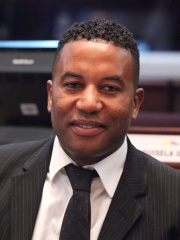
10. Ulises de la Cruz (b. 1974)
With an HPI of 49.88, Ulises de la Cruz is the 10th most famous Ecuadorean Soccer Player. His biography has been translated into 29 different languages.
Ulises Hernán de la Cruz Bernardo (born 8 February 1974) is an Ecuadorian retired footballer, who since 2013 has been a member of his country's National Assembly for the governing Mover. A defender, he played 101 times for the Ecuador national team between 1995 and 2010, and was selected for two FIFA World Cup tournaments. He spent his club career at Deportivo Quito, Barcelona S.C., Aucas, Cruzeiro, Hibernian, Aston Villa, Reading and Birmingham City. De la Cruz has set up a charity, Friends of FundeCruz, in his home village to fund a number of projects serving the local community.
People
Pantheon has 84 people classified as Ecuadorean soccer players born between 1937 and 2007. Of these 84, 81 (96.43%) of them are still alive today. The most famous living Ecuadorean soccer players include Antonio Valencia, Enner Valencia, and Iván Hurtado. The most famous deceased Ecuadorean soccer players include Alberto Spencer, Christian Benítez, and Jonathan González. As of April 2024, 6 new Ecuadorean soccer players have been added to Pantheon including Nicolás Asencio, Franklin Salas, and Jordy Caicedo.
Living Ecuadorean Soccer Players
Go to all RankingsAntonio Valencia
1985 - Present
HPI: 56.29
Enner Valencia
1989 - Present
HPI: 55.54
Iván Hurtado
1974 - Present
HPI: 52.20
Agustín Delgado
1974 - Present
HPI: 51.97
Segundo Castillo
1982 - Present
HPI: 51.11
Felipe Caicedo
1988 - Present
HPI: 51.11
Carlos Tenorio
1979 - Present
HPI: 50.27
Álex Aguinaga
1968 - Present
HPI: 50.14
Ulises de la Cruz
1974 - Present
HPI: 49.88
Iván Kaviedes
1977 - Present
HPI: 49.60
Willian Pacho
2001 - Present
HPI: 49.46
Édison Méndez
1979 - Present
HPI: 49.38
Deceased Ecuadorean Soccer Players
Go to all RankingsAlberto Spencer
1937 - 2006
HPI: 62.16
Christian Benítez
1986 - 2013
HPI: 46.14
Jonathan González
1995 - 2025
HPI: 27.82
Newly Added Ecuadorean Soccer Players (2025)
Go to all RankingsNicolás Asencio
1975 - Present
HPI: 40.20
Franklin Salas
1981 - Present
HPI: 38.12
Jordy Caicedo
1997 - Present
HPI: 36.04
Narciso Mina
1982 - Present
HPI: 35.24
José Cevallos
1995 - Present
HPI: 32.06
Stiven Plaza
1999 - Present
HPI: 30.31
Overlapping Lives
Which Soccer Players were alive at the same time? This visualization shows the lifespans of the 3 most globally memorable Soccer Players since 1700.

